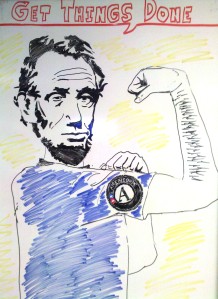Something I’ve noticed lately is that the more time and energy you invest in a person or an activity, the more you grow to love it.
Something about your brain devoting more wiring to them
…or maybe something about your learning so much about them that you can easily take their perspective (seeing something from someone else’s point of view is the bedrock of compassion)
…or maybe about feeling satisfaction from your efforts, so that you are shaped by the care you give.
So this morning, reading about the “new American rite of passage,” which is meant to be a year of national service, my imagination automatically takes me to a time when every U.S. citizen has the chance to invest time and energy in their community (or any community).
I see faces of adults (national service alums who are now parents, teachers, bankers, florists, landscapers, librarians, mayors, bakers…) who have struggled to understand the points of view of diverse people and systems, to affect change in the lives of others, who’ve created wiring in their brain for people and places on the margins. Who’ve been transformed, or “ruined for life” as Former Jesuit Volunteers claim they’ve been. I see individuals passing their learned insights onto their children, their value of giving.
The Franklin Project (an initiative of The Aspen Institute, and of John Bridgeland & Alan Khazei), published a plan of action that says it this way:
“Service makes citizens. In every generation, Americans who have undertaken national service—in military and civilian capacities—have emerged more connected to their generation and more invested in their country.”
The name of this blog comes from the notion that “The Service” is a nickname for military service, and that new generations of citizens have the chance to form a new service — meaningful direct and indirect service here in the States and elsewhere. My grandfather, a WWII vet and internee, said to me when I was a Peace Corps Volunteer serving in China, that he was proud of me for serving my country. I can’t describe how much his words meant to me.
Naturally there are many subcultures in which “service” looks exactly like being a member of a community — service isn’t always joining a program, moving to a new place, tracking your hours, and following a Federally approved position description as an AmeriCorps member.
That said, I’m excited to see what comes of the movement, both what comes next and what comes in time for the current generation of children when they are ready to come of age.




